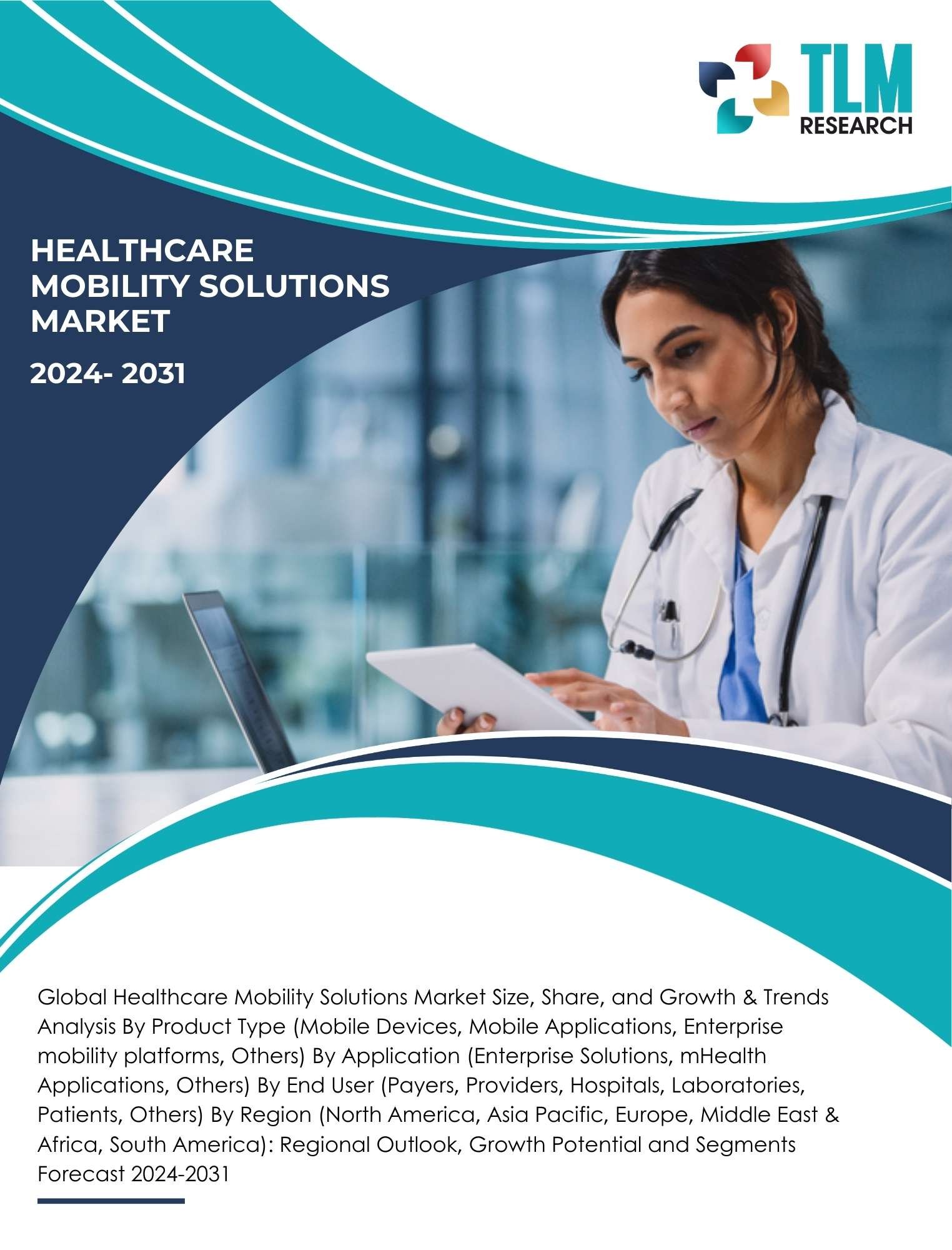Description
The Global Healthcare Mobility Solutions Market size was USD 25.0 billion in 2023 and is projected to reach USD 35.5 billion by 2031, with a CAGR of 24.8 % during the forecast period.
Global Healthcare Mobility Solutions Market Overview:
The global healthcare mobility solutions market is rapidly evolving, driven by innovations such as enterprise mobility platforms, mobile applications, wearable devices, AI and ML, 5G technology, and AR/VR. Enterprise mobility platforms offer comprehensive solutions for managing mobile devices, applications, and data, ensuring compliance with regulations and protecting patient information. Mobile applications enable healthcare professionals, patients, and caregivers to access services and information anytime, ranging from clinical communication tools to telemedicine platforms.
Wearable devices like smartwatches and fitness trackers facilitate continuous health monitoring, early detection of health issues, and improved disease management. AI and ML enhance clinical decision-making, patient outcomes, and workflow efficiency by analyzing large patient datasets to identify patterns, predict risks, and personalize treatments. The advent of 5G technology promises faster data transmission, lower latency, and reliable connectivity, which will advance telemedicine, remote patient monitoring, and real-time data sharing.
AR and VR technologies are transforming medical training, patient education, and therapeutic experiences by providing immersive and interactive environments. These innovations collectively propel the growth of the healthcare mobility solutions market, enabling more efficient, personalized, and patient-centric care while empowering patients to take an active role in managing their health.
Global Healthcare Mobility Solutions Market Dynamics
-
Drivers
1. Technological advancements
The rapid development of technology, such as AI, IoT, and telemedicine, significantly propels the healthcare mobility solutions market. These technologies enable remote patient monitoring, real-time data collection, and improved patient management, leading to enhanced patient outcomes and operational efficiencies. AI-driven analytics provide predictive insights, while IoT devices facilitate seamless data exchange.
The continuous evolution and integration of these technologies create a dynamic ecosystem that supports personalized healthcare, reduces hospital readmissions, and streamlines clinical workflows. The growing reliance on technology in healthcare not only improves patient care but also attracts investments, further driving market growth.
2. Increasing adoption of mobile health applications
With the proliferation of smartphones and mobile devices, there is a significant rise in the use of mobile health (mHealth) applications. These apps offer a range of functionalities, from fitness tracking and medication reminders to virtual consultations and health record management. The convenience and accessibility provided by mHealth apps encourage patients to actively participate in their healthcare management. Furthermore, healthcare providers benefit from improved patient engagement and compliance. The widespread acceptance and use of these applications are driving the demand for comprehensive healthcare mobility solutions, contributing to market expansion.
3. Rising prevalence of chronic diseases
The increasing incidence of chronic diseases such as diabetes, cardiovascular disorders, and respiratory conditions is a major driver for the healthcare mobility solutions market. These conditions often require continuous monitoring and management, which can be efficiently addressed through mobile health solutions. Remote monitoring devices and mobile apps enable real-time tracking of vital signs, medication adherence, and lifestyle adjustments. This proactive approach to disease management reduces the burden on healthcare facilities, lowers healthcare costs, and improves patient quality of life. The growing need for effective chronic disease management is fueling the adoption of healthcare mobility solutions.
-
Restraint
1. Data security and privacy concerns
One of the significant restraints in the healthcare mobility solutions market is the concern over data security and privacy. With the increasing digitization of health records and the use of mobile applications, there is a heightened risk of data breaches and unauthorized access. Protecting sensitive patient information from cyber threats is a major challenge for healthcare providers and technology developers. Ensuring compliance with regulations such as HIPAA and GDPR requires substantial investment in robust security measures, which can be a deterrent for some organizations. The fear of potential legal and financial repercussions from data breaches hampers the full-scale adoption of healthcare mobility solutions.
-
Opportunity
1. Expansion in emerging markets
The healthcare mobility solutions market holds significant growth potential in emerging markets. Countries in Asia-Pacific, Latin America, and Africa are witnessing rapid urbanization, increasing healthcare expenditure, and a growing middle class with rising disposable incomes. These regions are also experiencing a surge in smartphone penetration and internet connectivity. As a result, there is a substantial opportunity for the adoption of mobile health solutions to address healthcare access challenges and improve patient outcomes. Companies that can tailor their offerings to meet the specific needs and regulatory environments of these emerging markets stand to gain a competitive advantage and drive market growth.
2. Integration with wearable devices
The integration of healthcare mobility solutions with wearable devices presents a promising opportunity for market expansion. Wearables such as fitness trackers, smartwatches, and medical-grade monitors can continuously collect and transmit health data, providing valuable insights into a patient’s condition. When integrated with mobile health applications, these devices enable real-time monitoring and personalized health interventions. This synergy enhances patient engagement, encourages proactive health management, and facilitates early detection of potential health issues. The increasing consumer interest in wearables for health and fitness, combined with advancements in wearable technology, creates a fertile ground for growth in the healthcare mobility solutions market.
-
Segment Covered in the Report
1. Product Type
- Mobile Devices
- Mobile Applications
- Enterprise mobility platforms
- Others
2. Application
- Enterprise Solutions
- mHealth Applications
- Others
3. End User
- Payers
- Providers
- Hospitals
- Laboratories
- Patients
- Others
Regional Insights
The North America healthcare mobility solutions market is experiencing rapid growth, driven by the increasing adoption of mobile devices and advanced technologies within the healthcare sector. These solutions encompass mobile applications, enterprise mobility platforms, and mobile devices that facilitate efficient management of clinical workflows, patient care, and health data. The growing need for cost-effective healthcare services, the rising prevalence of chronic diseases, and an aging population further propel market expansion.
Integration of electronic health records (EHRs) and advancements in telehealth are pivotal in enhancing patient outcomes and operational efficiency. Additionally, regulatory frameworks supporting digital health innovations and investments in healthcare IT infrastructure are key enablers. The market is characterized by the presence of major players focusing on strategic partnerships, mergers, and acquisitions to enhance their product offerings and market reach.
Despite challenges such as data security concerns and interoperability issues, the North American healthcare mobility solutions market continues to evolve, driven by technological advancements and the increasing demand for accessible and quality healthcare services.
The Asia Pacific healthcare mobility solutions market is witnessing significant growth, driven by the rising adoption of mobile devices and the increasing need for efficient and accessible healthcare services. This market encompasses a range of applications, including mobile health (mHealth) apps, enterprise mobility platforms, and mobile devices like tablets and smartphones used by healthcare professionals.
Key factors propelling this market include the growing prevalence of chronic diseases, advancements in wireless networks, and supportive government initiatives aimed at improving healthcare infrastructure. Additionally, the COVID-19 pandemic has accelerated the demand for remote patient monitoring and telehealth services, further boosting market expansion. Countries such as China, Japan, and India are at the forefront of this growth due to their large populations and rapid technological advancements.
However, challenges such as data security concerns and the high cost of deployment may hinder market growth to some extent. Nevertheless, with ongoing innovations and increasing investments in healthcare IT, the Asia Pacific healthcare mobility solutions market is poised for substantial growth, promising enhanced patient care and operational efficiency in the healthcare sector.
Market Key Players
- Hewlett-Packard Company
- AT&T Inc.
- Cerner Corporation
- AirStrip Technologies, Inc.
- Omron Corporation
- Apple Inc.
- Cisco Systems, Inc.
- McKesson Corporation
- International Business Machines Corporations
- Oracle Corporation





